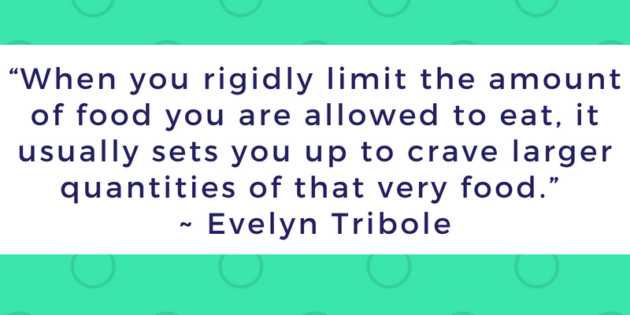What is Intuitive Eating?
Intuitive Eating is a non-diet approach to nutrition and wellness that helps people start to trust their body wisdom and its signals, break the cycle of dieting and change your relationship with food (and maybe their life). According to Tribole and Resch, the authors of Intuitive Eating, an intuitive eater is defined as a person who “makes food choices without experiencing guilt or an ethical dilemma, honors hunger, respects fullness and enjoys the pleasure of eating.”
The 10 Principles of Intuitive Eating
According to Tribole and Resch, Intuitive Eating is made up of ten core principles. The 10 core principles are –
Principle 1: Reject the Diet Mentality
Have you ever felt cheated from the diet books and magazines that offer you false hope of losing weight easily, quickly and permanently? Don’t worry you are not alone. Research indicates that dieting can hurt your psychological health and wellbeing.
Principle 2: Honour Your Hunger
Learn to recognise your biological hunger signals and feed it with adequate energy. By learning to honour your hunger, you can start to rebuild your trust with yourself and food.
Principle 3: Make Peace with Food
Are you ready to stop the food fight and give yourself unconditional permission to eat? When you tell yourself you cannot have or should not have a food, it can lead to feelings of deprivation and food cravings.
Principle 4: Challenge the Food Police
Have you recognised the voice inside your head that labels you as “good” for eating a salad for lunch and “bad” for eating dessert? This is the voice of the food police and it monitors the unreasonable rules that dieting has created.
Principle 5: Feel Your Fullness
Listen to your body signals when they let you know you are no longer hungry. One way of doing this is through the hunger-fullness scale.
Principle 6: Discover the Satisfaction Factor
Have you ever felt physically full but not satisfied? It can happen and if you are not satisfied from eating, you may continue to keep eating and eat up overeating, which is why it is important to discover the satisfaction factor.
Principle 7: Cope with Your Emotions Without Using Food
Even though emotional eating is common, it is important to find ways to nurture, comfort and attend to your emotions without using food. In the short-term, it may appear that food can help appease emotions, however in the end food will make you feel worse in the long run and doesn’t resolve challenges.
Principle 8: Respect Your Body
It is important to respect and accept your body. Respecting your body means accepting your genetic blueprint and your current body shape. When you do this, you can feel better about who you are.
Principle 9: Exercise – Feel the Difference
Instead of thinking about the exercise you think you “should” be doing, focus on what types of movement feel good to you. Forget about the calorie burning effect of exercise or how it can assist in weigh loss, focus on how it feels after you have moved your body.
Principle 10: Honour Your Health – Gentle Nutrition
When choosing to eat, make food choices that honour your health and taste buds. Aim for progress, not perfection and remember, it is what you eat consistently that is important.
The Research Behind Intuitve Eating
There are a number of studies and research on intuitive eating. These have found that intuitive eating in linked to –
- lower body mass index (BMI),
- increase in body acceptance,
- lower rates of disordered eating,
- lower rates of emotional eating,
- increase in intrinsic motivation to engage in physical activity,
- lower serum triglyceride levels,
- reduce risk for overall risk for heart disease,
- coping better with feelings around food, and
- increase self-compassion and psychological wellbeing.
What is the Difference Between Intuitive Eating and Mindful Eating?
In their book Intuitive Eating, Tribole and Resch indicate that Intuitive eating includes the principles of mindful eating, however –
“it also encompasses a broader philosophy, addressing the issues of cognitive distortions and emotional eating. It includes seeing satisfaction as a focal point in eating, physical activity/movement for the sake of feeling good, rejecting the dieting mentality, using nutrition information without judgement, and respecting your body, regarding of how you feel about its shape.” (p.232).
For people who are struggling with eating challenges, both mindful eating and intuitive eating can help facilitate normal eating.
Over to You…
I hope this post has given you some insight in to what is intuitive eating and some of the research behind it. If you have any questions, please feel free to write them below. Also – you are invited to download the free 10-minute mindful eating exercise here. You can learn more about our intuitive eating nutrition coaching programs to see how you can discover peace with food and develop your habits for wellbeing, no diets required.
Reference –
Tribole, E., & Resch, E. (2012). Intuitive Eating – A Revolutionary Program that Works. New York, USA: St. Martin’s Griffin.

















Leave A Response